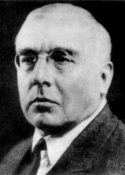
Gurdjieff International Review
Peter D. Ouspensky
1878–1947
P. D. Ouspensky was a major contributor to Twentieth century ideas. He anticipated many of the key questions in philosophy, psychology and religion that have driven and informed us throughout the century. Born in Moscow and raised by an artistic and intellectual family, Ouspensky refused to follow conventional academic training. While employed as a journalist, his extensive travels, personal studies, and a quest for the miraculous resulted in the publication of his brilliant Tertium Organum in 1912. He studied intensively with G. I. Gurdjieff between 1915 and 1918. Throughout the rest of his life, Ouspensky continued to promote Gurdjieff’s system as the practical study of methods for developing consciousness. He lived unobtrusively in England after 1921, exerting considerable influence among writers, conducting his own study groups and publishing The New Model of the Universe in 1931. In 1940, he moved to the United States with some of his London pupils and continued lecturing until his death in 1947, shortly after returning to England.
First published in The Encyclopedia of Religion edited by Mircea Eliade (1987) New York: Macmillan, Volume 11, pp. 143–144, Pentland’s sketch offers a succinct and original synopsis of Ouspensky’s contributions as an independent thinker and writer and as a leading exponent of Gurdjieff’s teaching.
This informed biographical outline was first published in Remembering Pytor Demianovich Ouspensky (1978) a brochure compiled by Merrily E. Taylor and is reproduced with the kind permission of the Manuscripts and Archives Division at Yale University Library.
Christopher Fremantle—a former pupil of Peter Ouspensky—provides an informed synopsis of Ouspensky’s importance as a philosopher and exponent of Gurdjieff’s teaching.
An article by journalist Carl Eric Bechhofer Roberts first published in The New Age (Jan 6, 1921) London: XXVIII (10), p. 113, and later in In Denikin’s Russia and the Caucasus, 1919–1920. Stranded in the midst of the Russian revolution, the author stays several days in a barn with Ouspensky and Zaharov, another of Gurdjieff’s students. Over a bottle of vodka, Ouspensky engagingly relates some of his light-hearted Moscow and Essentuki adventures.
Walter Driscoll surveys the major writings by and about Ouspensky, and highlights some additional writings that show his influence.
A synopsis by Dr. Jacob Needleman originally presented at the 1980 national meetings of the American Academy of Religion and first published in an expanded form as “Gurdjieff, Ouspensky and Esoteric Philosophy” in Consciousness and Tradition (1982) New York: Crossroads. This revision is published with the author’s kind permission. Professor Needleman offers a thoroughly considered synopsis of the cosmological and psychological ideas contained in Ouspensky’s In Search of the Miraculous.
On the first few pages of In Search of the Miraculous, P. D. Ouspensky describes his return to Russia in November of 1914 and how, working as a journalist, he came across this notice and put it in his newspaper that winter, shortly before his first meeting with Gurdjieff.
“I saw that the problem consisted in directing attention on oneself without weakening or obliterating the attention directed on something else. Moreover this ‘something else’ could as well be within me as outside me.”
“It is particularly important to observe the things that attract and keep the attention, because they produce imagination. Study of attention is a very important part of self-study.”
Other than Mr. Gurdjieff's own writings, “what other written material has the real stamp of authenticity? Of particular note in this regard is P. D. Ouspensky's In Search of the Miraculous: Fragments of an Unknown Teaching. However, given Ouspensky's early break with Gurdjieff, one might reasonably ask how reliable and complete Fragments is as an introduction? After all, the conversations Ouspensky records—more than two-thirds of Fragments consists of direct quotes from Gurdjieff—took place in Russian almost a century ago. Not only did Ouspensky have to remember his conversations with Gurdjieff but he had to translate his personal notes into a language that he learned later in life. Fortunately we have published appraisals of Fragments from several sources including some of Mr. Gurdjieff's most senior students.”
|
This webpage © 2015 Gurdjieff Electronic Publishing Revision: October 25, 2015 |